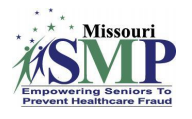Telehealth: A good opportunity for patients and scammers

This month’s Missouri SMP Fraud Fact deals with the expansion of telehealth services, which has opened yet another door for potential fraud.
Certainly, telehealth is a legitimate service provided by a growing number of physicians.
Medicare covers telehealth services, including office visits, psychotherapy, consultations, and certain other medical or health services that are provided by an eligible provider. These visits are performed via an interactive, two-way telecommunications system (like real-time audio and video).
Unfortunately, criminals are exploiting this new service for fraudulent purposes. If someone calls you with an unsolicited request to verify your pain symptoms, it most likely is a scam. It could be a telehealth doctor trying to approve you for durable medical equipment (DME) that you do not need or did not request. Other unsolicited callers could ask you to verify your family history of cancer. That’s most likely an attempt from a telehealth doctor trying to approve you for a genetic testing kit that actually needs to be ordered by your treating physician.
To protect yourself, make sure you know who is on the other end of the phone and that you have an appointment with a provider whom you trust and recognize. If you have doubts, call the provider back on a number you know is legitimate or use a secure computer portal to make contact.
Again, telehealth is a safe and efficient option for you to visit with your provider; however, you must be careful so that you don’t get scammed.
To learn more or report suspected Medicare fraud, call the Missouri SMP at 1-888-515-6565.
The Missouri SMP is a non-profit agency that empowers and assists Medicare beneficiaries to prevent, detect and report healthcare fraud, errors and abuse. Medicare fraud and abuse costs taxpayers an estimated $60 billion-plus annually.
This project was supported, in part by grant number 90MPPG0040, from the U.S. Administration for Community Living, Department of Health and Human Services, Washington, D.C. 20201. Grantees undertaking projects under government sponsorship are encouraged to express freely their findings and conclusions. Points of view or opinions do not, therefore, necessarily represent official Administration for Community Living policy.
